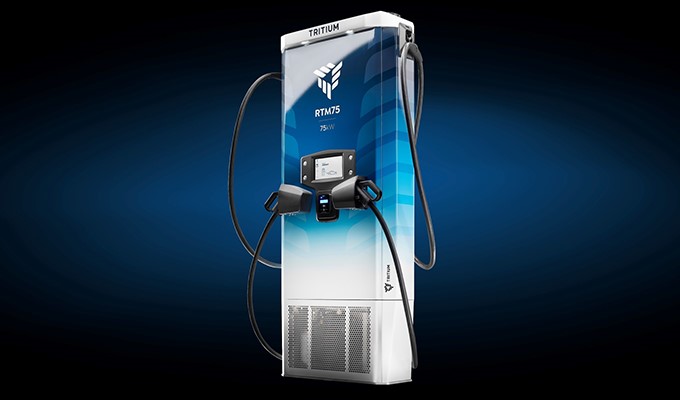Tritium, a leader in DC fast charging technology for electric vehicles (EVs), launched its MSC hardware platform. This is the first platform to enable truly scalable EV charging networks anywhere in the world.
The MSC (Modular Scalable Charging) hardware platform provides flexibility for EV customers. It allows them to increase the power level of their charger as charging capabilities advance. Charger power can be increased in 25kW increments, starting at 25kW and increasing to 350kW and beyond.
Part of the launch, Tritium also revealed the first charger built on the platform, the next-gen RTM75 DC Fast Charger. This charger allows drivers to add 46 miles of range to an electric vehicle in 10 minutes of charging. The slim charger also allows for simultaneous charging of two vehicles at once. It is built with urban, retail, fleet, and public environments in mind.
“This has been something the industry and our customers have asked for over the years,” says Jane Hunter, Tritium CEO. “We are the first company in the world to deliver it. With our MSC platform, 50kW DC chargers can quickly be upgraded to 75kW, 100kW, and beyond without a rip-and-replace required.
“This solution is future-proofing governments and network operators across the globe, something they have been crying out for,” Hunter continues. “No longer is a charger just a charger; instead, it’s a first step to meet the needs of both today’s and tomorrow’s electric vehicles.”
EV CHARGER REVOLUTION
Previously, network operators had to pre-order and install chargers from a set of prefabricated charging options; these were often set at 50kW (fast or rapid chargers), 175kW, or 350kW (high power or ultra-fast chargers).
However, the MSC hardware platform allows for the quick installation of additional power electronics modules within each MSC-designed charger, such as the RTM75 and future iterations of Tritium chargers. For instance, charger operators can purchase an RTM75 charger starting at 25kW or 50kW, pending their current power requirements. Once their needs change, they can scale the charger to 75kW.
“The MSC hardware platform provides the next level of capital efficiency and scalability while still providing all the great attributes Tritium’s products have become known for: design, slimness, and low maintenance,” says Dr. David Finn, Tritium chief growth officer and founder. “The electrification of transportation is at tipping point, so our customers want to know how they can easily extend their charging site capacity over the coming years. They want no regrets and capital efficient scaling of their charging sites. Tritium’s MSC Hardware Platform allows our customers to scale their charging sites for half the price and configure their charging sites for a desired reliability.”
“The MSC platform will allow Tritium to rapidly deploy new product, and our aim is to provide at least one new product every quarter to address the needs of customers servicing the home/workplace, public, (and) fleet depot segments. The first product on the MSC Hardware Platform is the RTM75, with the PKM150 and PKM350 following in 2021.”
THE RTM75
Catering to an expected increase in the need for public charging infrastructure, Tritium worked with its customers to develop a scalable, easy-to-install solution that works in retail, urban, and public environments where the demand for easy-to-access charging infrastructure will be most pronounced.
“We listened to the industry, our customers, and to governments across the globe, and the RTM75 is the result of those conversations,” Hunter says. “These chargers can be installed quickly, scale as required, and are suitable to be installed anywhere; from shopping center carparks to urban environments and at service stations, the RTM75 is ready for primetime.”
The RTM75 facilitates simultaneous charging for two EVs at a time and supports all charging standards on the market, including CCS and CHAdeMO, and satisfies the needs of all batteries up to 920V.
Further, Tritium equipped the RTM75 with Plug and Charge (ISO 15118) technology. This eliminates credit card payments or RFID authentication at the charger. Instead customers can pay through the charging cable when it communicates to the car directly; a driver need simply to plug in their EV, charge their vehicle, then drive away. They’ll leave knowing that payment was automatically and securely managed via digital authentication certificates that contain pre-approved payment and configurations.
Tritium designed the RTM75 to accommodate the most stringent acoustic noise regulations with its Whisper Mode. This gives owners the flexibility to derate the charger’s power to meet municipal noise abatement requirements. Coupled with the sealed electronics enclosure and Tritium’s small footprint, the RTM75 can fit where other chargers simply cannot. The fully sealed enclosure reduces wear and tear, decreasing the need for maintenance and prolonging the life of the charger. This charger withstands temperatures from -31 degrees F to 122 degrees F while keeping electronics free from contaminants.
Find out more, visit www.tritiumcharging.com.




